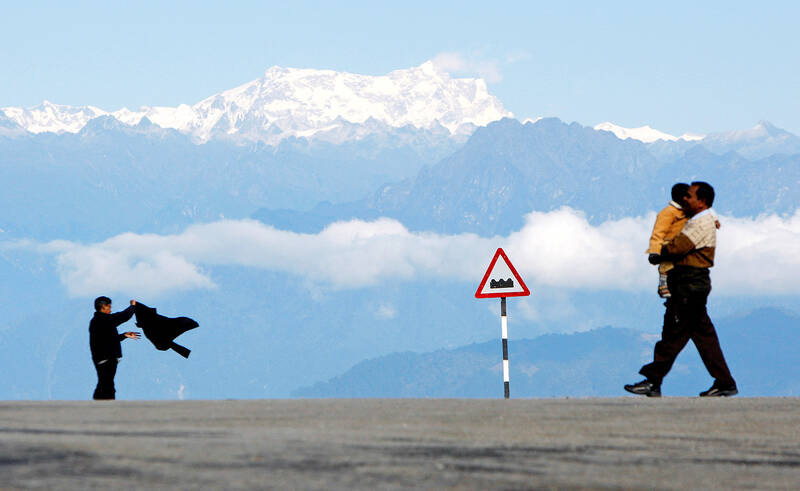Twenty-nine runners yesterday set off on a rare high-altitude race in Bhutan to highlight the dangers of climate change to the Himalayan kingdom sandwiched between China and India, two of the world’s biggest polluters.
Bhutan — which is about the size of Switzerland — has forests covering 70 percent of its land, which absorb nearly three times more climate-changing emissions than the country produces a year.
“The race is designed to raise awareness about climate change and its risks to our economy and the livelihood of the people,” Bhutanese Minister of Foreign Affairs Tandi Dorji said by telephone after flagging off the race in the northwestern town of Gasa.

Photo: Reuters
Organizers said the runners would take five days to complete the 203km Snowman Race from Gasa to the northeastern town of Chamkhar along a trail that normally takes trekkers up to 20 days.
South Asia’s only carbon-
negative country, with a population of fewer than 800,000 people, is vulnerable to the effects of climate change, which is speeding up the melting of its glaciers, and causing floods and unpredictable weather patterns.
Pakistan, at the western end of the Himalayas, has this year been hit by unprecedented flooding caused by unusually heavy rain and faster runoff from its glaciers. Its government and the UN have blamed climate change.
The racers from 11 countries — including the US, Germany, Japan, Tanzania and Bhutan — are to run at an average altitude of 4,500m, with a high point of 5,470m.
The route will take them through diverse terrain from subtropical jungle to fragile, high-altitude ecosystems, with diverse flora and fauna, as well as people and cultures.
“I’ve probably completed maybe around 30 ultramarathons, but never like this,” US runner Sarah Keyes told the state-run Bhutan Broadcasting Service.
“It will be somewhat of an unknown going to that high of an altitude, but I do feel good overall, physically,” Keyes said.

The death of a former head of China’s one-child policy has been met not by tributes, but by castigation of the abandoned policy on social media this week. State media praised Peng Peiyun (彭珮雲), former head of China’s National Family Planning Commission from 1988 to 1998, as “an outstanding leader” in her work related to women and children. The reaction on Chinese social media to Peng’s death in Beijing on Sunday, just shy of her 96th birthday, was less positive. “Those children who were lost, naked, are waiting for you over there” in the afterlife, one person posted on China’s Sina Weibo platform. China’s

‘NO COUNTRY BUMPKIN’: The judge rejected arguments that former prime minister Najib Razak was an unwitting victim, saying Najib took steps to protect his position Imprisoned former Malaysian prime minister Najib Razak was yesterday convicted, following a corruption trial tied to multibillion-dollar looting of the 1Malaysia Development Berhad (1MDB) state investment fund. The nation’s high court found Najib, 72, guilty on four counts of abuse of power and 21 charges of money laundering related to more than US$700 million channeled into his personal bank accounts from the 1MDB fund. Najib denied any wrongdoing, and maintained the funds were a political donation from Saudi Arabia and that he had been misled by rogue financiers led by businessman Low Taek Jho. Low, thought to be the scandal’s mastermind, remains

‘POLITICAL LOYALTY’: The move breaks with decades of precedent among US administrations, which have tended to leave career ambassadors in their posts US President Donald Trump’s administration has ordered dozens of US ambassadors to step down, people familiar with the matter said, a precedent-breaking recall that would leave embassies abroad without US Senate-confirmed leadership. The envoys, career diplomats who were almost all named to their jobs under former US president Joe Biden, were told over the phone in the past few days they needed to depart in the next few weeks, the people said. They would not be fired, but finding new roles would be a challenge given that many are far along in their careers and opportunities for senior diplomats can

Australian Prime Minister Anthony Albanese yesterday announced plans for a national bravery award to recognize civilians and first responders who confronted “the worst of evil” during an anti-Semitic terror attack that left 15 dead and has cast a heavy shadow over the nation’s holiday season. Albanese said he plans to establish a special honors system for those who placed themselves in harm’s way to help during the attack on a beachside Hanukkah celebration, like Ahmed al-Ahmed, a Syrian-Australian Muslim who disarmed one of the assailants before being wounded himself. Sajid Akram, who was killed by police during the Dec. 14 attack, and